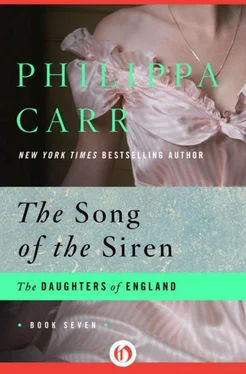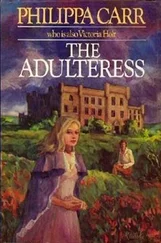“I always think,” said my mother, “that if one set out to change all that, one could.”
”How, Priscilla dear?” asked my grandmother.
“Cut away some of the undergrowth, for one thing. It’s terribly overgrown. Get a little light into the place. Bring in the sunshine. I visualise a happy man and his wife with a horde of children. It’s light and laughter that place lacks.”
“Dear Priscilla!” was all my grandmother said.
Of course, I thought, there had been a murder in it. Beaumont Granville was murdered there and lay buried nearby. Then there was the original ghost who had tried to hang herself from the minstrels’ gallery.
“Tell us about this man,” said my mother.
“He fitted the place, I will say that. He was lame, and of a morbid countenance.
He looked as if it would really hurt him to smile. He was not by any means old. I said to him: ‘And if you took the house would you live here alone?’ He said he would, and I must have looked surprised for he added: ‘I prefer it that way,’ as though warning me to keep my thoughts to myself, which I certainly decided to do. He said the place was dark and gloomy. I said exactly what you have been saying, Priscilla.
Cut things down and let the light in.”
“What about the furniture?” said my mother, and I immediately thought of that bedroom and the four-poster bed with the red curtains.
“He said that it would suit him to have the place furnished.”
“Well, that would solve a problem,” said my mother.
“It will solve nothing. I think he just revelled in looking at the place for the purpose of showing us how unsalable it was.”
“Well, it looks as though he succeeded.”
“I think we should get rid of the furniture, clear it out ... repair the place from top to bottom and then see what happens. In any case we need give no more thought to Jeremy Granthorn. We shall not be hearing from him again.”
But there she was wrong.
The new owner of Enderby Hall was Jeremy Granthorn.
He did nothing to improve the reputation of Enderby Hall.
Abby, one of the maids whose duty it was to attend to my special needs and who had been given the task of doing this by my mother because not only was she a good worker but, as I had heard my mother say, a cheerful one, which I think meant that she was rather garrulous.
I did not talk much. I was always shut in with my own thoughts but Abby was one of those people who did not need a very attentive audience.
As she dusted and polished my room, and I lay idly watching or reading or sewing, she would give out a stream of conversation about what was going on. I would nod and murmur occasionally because I did not like to spoil the pleasure she took, although I was rarely very interested.
That was my trouble. Nothing nowadays was of any interest to me.
She chattered about the affairs of the neighbourhood and gradually I found that the name of Jeremy Granthorn was creeping more and more into her conversation.
“He’s got a man there, mistress, his only servant. They say he don’t like women.”
She giggled. “Funny sort of man I’d say, mistress. And this man ... Smith ‘is name is ... is just like him. Emmy Camp was walking by one day and she thought she’d look round a bit. This Smith was in the garden ... and Emmy asks him the way to Eversleigh village. As if she don’t know. Born and bred there. Emmy says: ‘Which path do I take?’
And he points it out to her without a word, and she says, ‘Are you dumb, sir?’ And then he tells her to mind her tongue and not be insolent. Emmy says all she was doing was asking the way. Emmy says he didn’t believe her. ‘You’ve come prying,’ he said.
‘We don’t like pryers here. Be careful. There’s a big dog here and he don’t like pryers either.’ Emmy was all taken aback. She’s got an eye for the men and they for her in the general way. Not this Smith, though. She reckons he’s just like his master.”
I said: “Emmy should not have pried. It’s none of her business.”
“Oh, no, mistress, but you know how it is. We all likes to know what’s going on.
...”
Another day she told me: “Nobody’s ever been there. Biddy Lang says she reckons they’re only ghosts themselves. Two men ... in that big house ... it don’t seem natural, that’s what Biddy says.”
It was no concern of mine what happened to the house. I had promised myself that I would never go in it again.
Since Clarissa’s visit I had walked a little. My mother was delighted. She said it was a sign I was getting better and in time I would be quite well.
I did not tell her that the only thing that had changed was that I could use my legs ... but only a little. I was soon tired. And it was not so much the physical nature of my illness but the terrible lassitude, the listlessness, the not caring about anything which was the hardest to bear.
When my mother read to me I had little interest in what she was reading. I pretended to but it was a poor pretence. When my father played chess with me I played the game joylessly without excitement. Perhaps that was why I won more then he did; I was calm, dispassionate, unmoved by victory or defeat.
That was what was so hard to bear, this lack of interest in life.
But I did find that I was listening more to Abby. I rarely commented and never asked questions but when she mentioned the strange pair at Enderby I did feel a slight quickening of interest.
I had taken to riding a little. I never went far because I became so tired. But when I went to the stables and Tomtit nuzzled against me and whinnied and showed so clearly how happy he was to see me I felt I would like to ride again. And how he tossed back his head and expressed delight in every quiver of his body when I mounted, so I thought I must ride now and then ... because of Tomtit.
I had behaved so badly to him on that night. I had left him shivering in the outhouse while I had gone into the forbidden wood. I had forgotten him. That was the worst way to treat an animal.
He bore me no malice. When I first approached him, full of remorse wondering what reception I should get from him, he had shown me so clearly that he had forgotten my carelessness towards him. Malice? There was nothing of that. There was only that fond devotion and the bond between us was as strong as ever.
So I rode out now and then and I used to let Tomtit take me where he would. He never galloped; he rarely cantered; he would walk with me gently and when I was tired I’d bend forward and say to him: “Take me home, Tomtit.” And he would turn from where we were going and we’d take the shortest cut home.
I think my parents would have been anxious if I had gone out with any other horse.
They used to say: “She’s safe with Tomtit. He’ll look after her.”
He was a wonderful horse, my dear friend Tomtit.
On that morning as usual I gave him his head and he led me to Enderby Hall, and when we reached there a desire came to me to visit Belle’s grave.
I dismounted, which was an unusual procedure because I did not usually do that until I was back in the stables.
I tethered Tomtit to a stake and I whispered to him: “I won’t forget you this time.
I’ll soon be back.”
So I went into what I used to think of as the forbidden wood. How different it was now. The gloom had vanished. Over what must have been Belle’s grave the roses bloomed in the summer.
It was my mother’s private garden now.
Much of the undergrowth had been cut away. It was beautiful-an oasis in the heart of the country. A garden of roses where once there had been gloom.
I stood for a moment thinking of Belle, whose curiosity had brought about her death; dear Belle, she had been beautiful and friendly and good. Her death would have been quick, though, and now I knew why it had happened I could not blame my father.
Читать дальше








